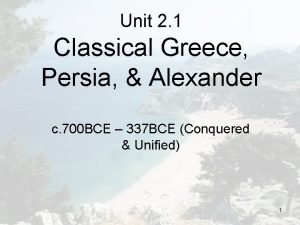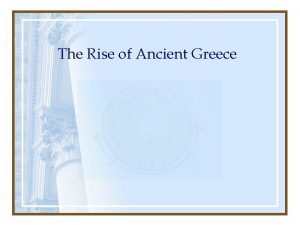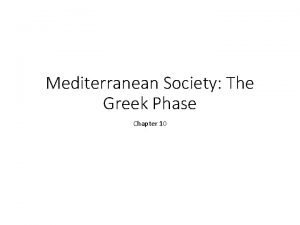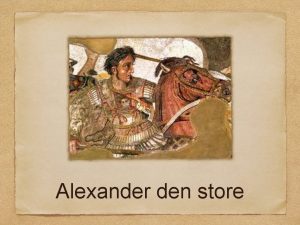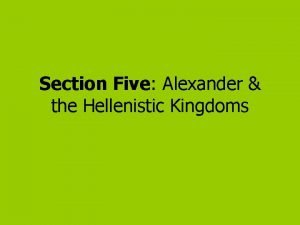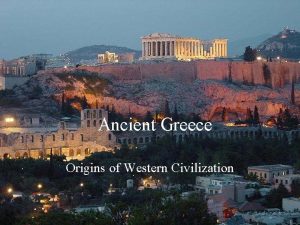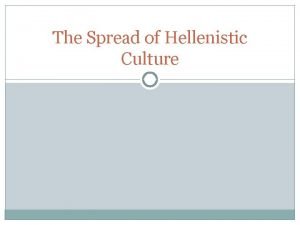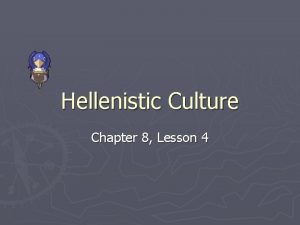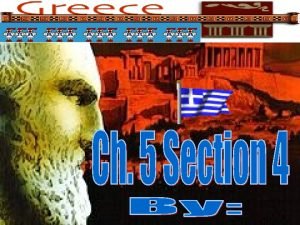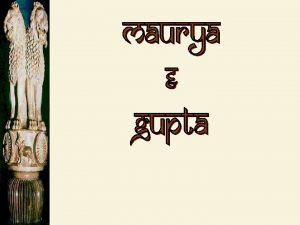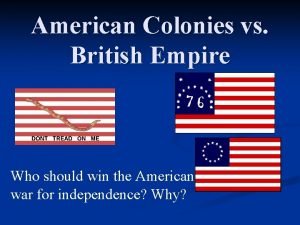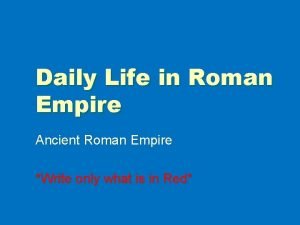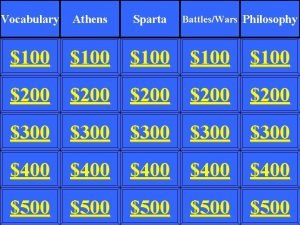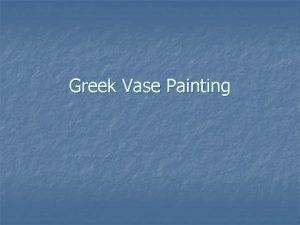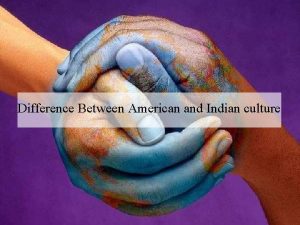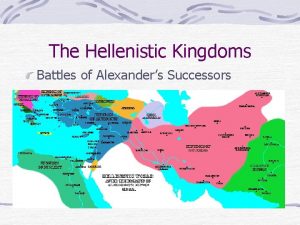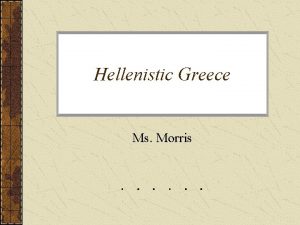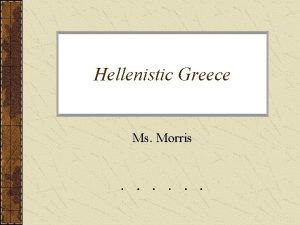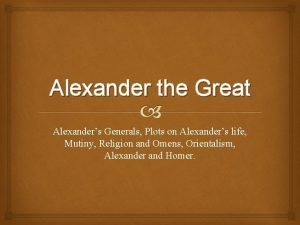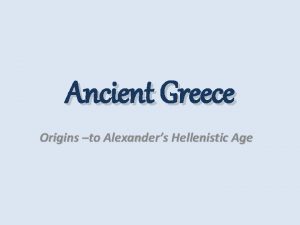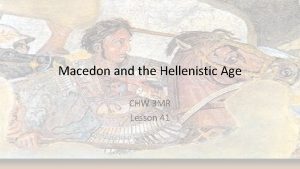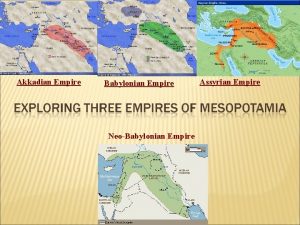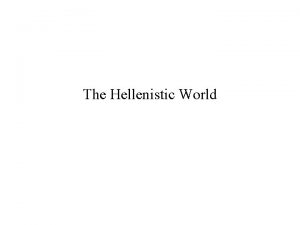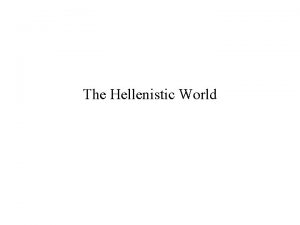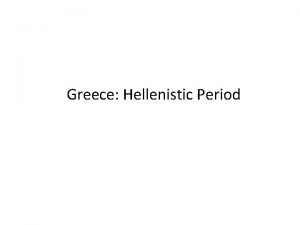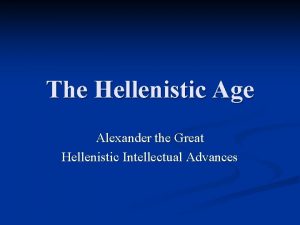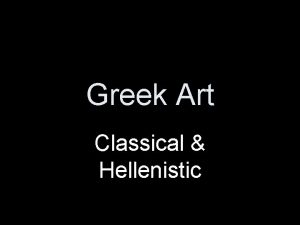Alexanders Empire and Hellenistic Culture CHW 3 MI





















- Slides: 21

Alexander’s Empire and Hellenistic Culture CHW 3 MI – Mrs. Helmer

About Alexander… – 20 years old – Studied in Athens, Greece under the great philosopher, Aristotle – Great warrior – His father was Philip II of Macedonia, who was a great leader, but made many enemies. • He was murdered by a young noble.

BUT WHERE? • Alexander the Great’s conquests took place in the Macedonian Empire in 334 – 323 BC • The areas of Mesopotamia and Persia were invaded and conquered by Alexander • The city of Gaugamela where the epic Battle took place! • LINK

Aim: What is the legacy of Alexander the Great? • Do Now: Terms!!! • Hellenistic Civilization: The combination of Greek, Egyptian, Indian and Persian cultures through the conquests of Alexander the Great.

The Hellenistic Age During this time, new Greek cities were founded in all parts of the empire. These cities became centers of Greek culture. Trade grew between the Hellenistic cities and far-off parts of the world. One of the cities Alexander founded, Alexandria in Egypt, became the greatest center of trade and learning.

Discovery and Invention Greek science and math Doctors made many discoveries about how the human body works. Hippocrates is the father of medicine. Archimedes = famous inventor of his time. Pythagoras and Euclid = mathematicians.

The Peloponnesian War • Sparta and Athens declared outright war on each other for domination of Greece and national pride called the Peloponnesian War. • Athens would be defeated in the end, but it weakened all the Greek city-states allowing for invasion by Philip the II of Macedonia.

Philip Builds Macedonian Power • Phillip’s Army – Used the phalanx and a fast moving cavalry defeat Greek City States. • Assassination – Philip was assassinated and Alexander becomes king of Macedonia and Greece. He decides to expand his empire.

Alexander Conquers • Alexander’s outnumbered army defeats Darius and his grand army at the Battle of Gaugamela. • Alexander conquers Persian controlled Egypt and is crowned King. After that he turns to conquer India. • Before his death Alexander the Great’s Empire controls most of the known world in 326 BCE

Alexander’s Legacy • Even though Alexander died and his empire he left a lasting legacy by spreading western civilization. • Alexander united most of the known world and started cultural diffusion and trade between Greece, Egypt, India and Persia. This became known as Hellenistic Civilization (Asian/Greek Influence) • Alexander founded many cities in the Greek Style • Alexander assimilated or adapted the cultures of the areas he conquered, worshipped at their temples and allowed them some self rule.

The Phalanx back

Greek Calvary Back

Battle of Gaugamela.

THE BATTLE OF GAUGAMELA – 331 BC • VIDEO • Back - The Persian Army fell to Alexander… The war might have been different if the High King Darius was a bit more determined… He simply “gave up”. - Alexander pushed onward to conquer Egypt. . He became the High King of Persia - He planned to move onto Rome and stop the ever powerful and growing society, but he died of a fever in 323 BC

Alexander the Great’s Empire Back

The “Known” World – 326 B. C. E. BACK

Pergamum: A New “Hellenistic” City Cosmopolitan Culture Back

Trade in the Hellenistic World Back

Cultural Diffusion Back

What concept is being shown here?

Journal Writing Assignment • Forming and supporting opinions: Read “Alexander the Great” Handout. • Do you think that Alexander was worthy of the title “Great”? Explain using information from class.
 Alexanders empire
Alexanders empire Alexanders empire
Alexanders empire Alexanders empire
Alexanders empire Alexander den store häst
Alexander den store häst The hellenistic kingdoms
The hellenistic kingdoms Mathematical methods in hellenistic times
Mathematical methods in hellenistic times Hellenistic culture meaning
Hellenistic culture meaning The alliance of greek city-states was called the _____.
The alliance of greek city-states was called the _____. Spread of hellenistic culture
Spread of hellenistic culture Lesson 4 hellenistic culture
Lesson 4 hellenistic culture Why were hellenistic cities important
Why were hellenistic cities important Mauryan empire and gupta empire venn diagram
Mauryan empire and gupta empire venn diagram American empire vs british empire
American empire vs british empire Rich and poor romans
Rich and poor romans Pythagoras and euclid were outstanding hellenistic
Pythagoras and euclid were outstanding hellenistic Lesson 5 alexander and the hellenistic era
Lesson 5 alexander and the hellenistic era Geometric vases greek
Geometric vases greek Culture includes
Culture includes Fed-batch
Fed-batch American culture vs indian culture
American culture vs indian culture Stroke culture method
Stroke culture method Folk culture and popular culture venn diagram
Folk culture and popular culture venn diagram
